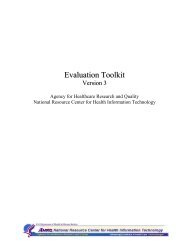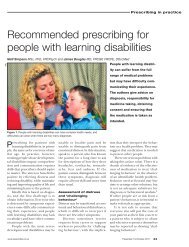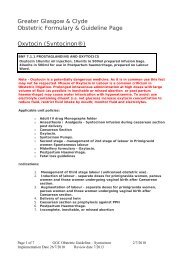The Fife Dementia Strategy: 2010 â 2020 - The Knowledge Network
The Fife Dementia Strategy: 2010 â 2020 - The Knowledge Network
The Fife Dementia Strategy: 2010 â 2020 - The Knowledge Network
Create successful ePaper yourself
Turn your PDF publications into a flip-book with our unique Google optimized e-Paper software.
4.13 Palliative & End of Life Care<br />
AIM<br />
People with dementia and their families receive care that integrates a<br />
palliative approach and is of high quality through to the end of life. <strong>The</strong><br />
care delivered is based on planning by the person with dementia and their<br />
family which is completed following diagnosis and reviewed regularly.<br />
RECOMMENDATION TO ACHIEVE THIS<br />
4.13.1 Ensure the needs of people with dementia and their carers are<br />
recognised in the development and delivery of the Living & Dying Well<br />
Local Action Plan.<br />
Many people traditionally associate palliative care as an approach which is<br />
employed as a person nears the end of life; however the palliative care<br />
approach extends far beyond this. It focuses on the person, not the disease,<br />
and applies a holistic approach to meeting the physical, practical, functional,<br />
social, emotional and spiritual needs of patients and carers facing progressive<br />
illness and bereavement. In order to improve the care of people with dementia<br />
it must be recognised by everyone involved in their care recognises this.<br />
<strong>Dementia</strong> is not often viewed as a terminal disease, likely due to its<br />
progressive nature. However, as highlighted in Living & Dying Well, palliative<br />
and end of life care are integral aspects of the care delivered by any health<br />
and social care professional to those living with and dying from any advanced,<br />
progressive or incurable condition 75 . Unlike cancer, organ failure or other<br />
terminal conditions, it can be very difficult to accurately assess when a person<br />
with dementia reaches the terminal state (less than 6 months until death), and<br />
for this reason end of life care plans are not considered or prepared by the<br />
majority of people with dementia until they have significantly progressed, often<br />
beyond the point of having sufficient mental capacity to make decisions<br />
Having Alzheimer’s, you’re alright today, you might not be alright<br />
tomorrow, sort of thing. You might not be alright next week, next month,<br />
next year. You might be alright for another 20-30 years. You don’t know.<br />
So therefore you put that (plan) into place. (Service user with dementia)<br />
[At the end of life] you want somebody who cares, and they need to know<br />
what to do with you…I made sure my sister and daughter know what I<br />
want. And they say to me, they say to me “oh, do not talk about it”. But I<br />
say “No. I’m wanting to speak about it before anything happens to me.”<br />
<strong>The</strong>y know what to do. (Service user)<br />
75 Scottish Government (2008). Living & Dying Well: a national action plan for palliative and<br />
end of life care in Scotland. Edinburgh.<br />
83
















